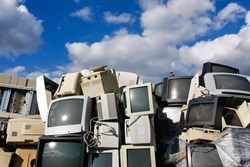
Related
Top stories






More news


Marketing & Media
Ads are coming to AI. Does that really have to be such a bad thing?














E-waste includes information communication technology (ICT) equipment, consumer and entertainment electronics, electronic tools and toys, automated teller machines (ATMs), health care and security equipment.
The e-Waste Association of South Africa (eWASA) has been collecting, sorting and disposing of e-waste in an environmentally friendly way since 2008. The Institute of Waste Management of Southern Africa (IWMSA), leaders in the waste management industry and committed to supporting professional waste management practices, has urged South Africans to support eWASA and dispose of e-waste correctly.
"E-waste falls under the larger waste spectrum and the general public are urged to dispose of electronic waste correctly. E-waste can be defined as anything that runs on electricity and includes goods that require batteries to operate," says Dr Suzan Oelofse, president of IWMSA.
"E-waste should not be discarded with municipal waste as it contains heavy metals such as mercury, which can contaminate water resources. It should be collected and separated as the discarded equipment contains valuable, rare and hazardous materials," says Keith Anderson, chairman of eWASA. "The valuable and rare resources can be recovered and enter the product life cycle again as raw materials, while the hazardous components need to be treated and disposed of in an environmentally sound manner."
South Africa has a well-developed, formal e-waste management system that collects, refurbishes, dismantles and recycles discarded products. Most urban centres have various collection points for e-waste, and eWASA member companies and their partners, including retailers such as Makro and Pick n Pay, are working to expand the current footprint of 635 collection sites. "Recycled e-waste plastics are used to manufacture fence droppers, roof tiles and guttering. Cathode ray tube (CRT) glass can be used for road surfacing and Waste2Art projects create crafts, jewellery and arts using dismantled e-waste," says Anderson.
The Waste Classification and Management Regulations under the Waste Act call for a total ban of the disposal of e-waste in landfill sites by 2021, with a ban on mercury bearing lamps by 2016. "E-waste workers can be exposed to many harmful effects of carcinogens and other hazardous substances found in e-waste", explains Anderson.
"South Africa is running out of landfill space and we cannot afford to discard valuable resources. The next eWASA e-waste collection day event will take place on 19 September 2014 as part of the Clean-Up and Recycle Week initiative and we urge the community to take part and help preserve our environment," concludes Oelofse.